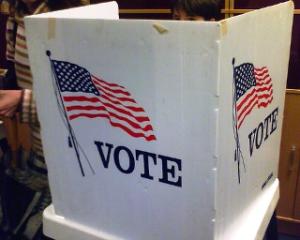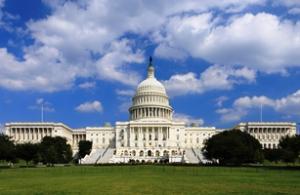Planning a summer vacation? Here's something to ponder.
The National Football League is taking a second look at its marijuana policies, no medical marijuana for Nebraska this year, New Jersey is moving to expand its medical marijuana system, and more.
A federal bill to protect immigrants working in the marijuana industry gets filed, the Oregon Senate approves a marijuana interstate commerce bill, the San Antonio DA is no longer prosecuting picayune drug possession cases, RAND says China will have a hard time stopping fentanyl, and more.
Joe Biden comes out for marijuana decriminalization, a pot legalization bill gets introduced in Delaware, heroin-related emergency room visits are declining, Brazil's Congress just approved a new, retrograde drug law, and more.
The state treasurers' association wants banking access for legal marijuana, New Jersey sees a sudden decriminalization and expungement bill, a Texas CBD medical marijuana bill gets expanded, and more.
The nation's leading drug policy reform group is seeing staff cuts and state office shutdowns, the NFL and its players' union are looking at league marijuana policies, Connecticut lawmakers may put legalization up to a popular vote, and more.
A federal marijuana descheduling bill picks up some cosponsors who want to be president, the California Senate approves a bill to allow special banks to deal with state-legal pot businesses, the drug czar announces a new initiative, and more.
Thanks to a new report on state-by-state drug issues, courtesy of WalletHub, we now have a good idea which are the most perilous for people who use drugs, whether its marijuana, mushrooms, or methamphetamines. (The report doesn't break down which drugs people were arrested for.)
The Five States with the Highest Rates of Drug Arrests
- South Dakota (tie)
- Wyoming (tie)
- South Carolina (tie)
- North Dakota
- Mississippi
We have a three-way tie for worst place and, notably, a clear regional pattern. Three of the top drug arrest states are neighbors in the thinly populated region where the northern plains eventually run into the Rocky Mountains. All are deep red states. The other two are in the heart of Dixie, and are also deep red.

There are more than a million drug arrests in the US each year. Some places are more into it than others, though. (Cr. Commons)
None of these states has legalized or even decriminalized marijuana (North Dakota just
decriminalized this month, but it's not in effect yet), which accounts for roughly half of all drug arrests. So there's that, too.
An oft-heard lament of bikers attending the annual Sturgis motorcycle rally in South Dakota's Black Hills is that "you come for a stroll, but leave on parole" (or, in a more optimistic variant, "you come on vacation, but leave on probation"). One reason for that and for the state's number one ranking here is South Dakota"s unlawful ingestion or "internal possession" law, a uniquely regressive andst repressive addition to the drug war armory.
Under that law, anyone who tests positive for drugs is subject to a criminal penalty -- a misdemeanor in the case of marijuana, a felony for other illicit drugs. And state law enforcement routinely seeks drug tests from arrestees. If they refuse to consent, state judges routinely rubber stamp search warrant requests, and law enforcement threatens to forcibly catheterize uncooperative arrestees. Something to keep in mind on your way to Mt. Rushmore this summer.
The law applies even if the drug were ingested elsewhere. Consider that. Someone who lawfully used medical marijuana in neighboring Montana, North Dakota, or Minnesota could come to South Dakota, get hit by a car crossing the street, get drug tested in the hospital, and be arrested for unlawful ingestion under state law. Likewise, someone who smoked marijuana in neighboring Nebraska, where it is decriminalized, could face a stiffer punishment for having pot in his urine in South Dakota than if he had been caught with actual marijuana in Nebraska, where he would just pay a fine.
A bill that would remove unlawful ingestion charges for marijuana died in the legislature earlier this year. A bill to study the unlawful ingestion law, SB 167 has been signed into law this year, but only after it was amended to remove any specific mention of unlawful ingestion. Instead, it sets up a commission to study alternatives to imprisonment for drug offenses.
The Five States with the Lowest Rates of Drug Arrests
- Alaska
- Massachusetts
- Washington
- Vermont
- Rhode Island
Again, a clear regional pattern emerges. Three of these states are in New England, while the other two are in the Pacific Northwest (stretching it a bit for Alaska). All of them except Alaska are deep blue states.
And all of them except Rhode Island are legal marijuana states. Rhode Island is a decriminalization state. No wonder these states have the lowest drug arrest rates; half of all drug arrests go up in smoke with legalization, or even decrim.
Two of these states -- Massachusetts and Washington -- have Law Enforcement-Assisted Diversion (LEAD) programs, which shunt potential drug arrestees into the public health and drug treatment systems instead of the criminal justice system. That shrinks drug arrest numbers, too.
And it shrinks arrest numbers not only by detouring drug offenders into treatment or social services instead of the courts, but also by producing a much lower future arrest rate among people who have been diverted. In Seattle, where LEAD was first introduced, people in the program were 58% less likely to be rearrested.
So… if you're headed for Mt. Rushmore or Ft. Sumter, you've been warned. Maybe visiting Plymouth Rock or Mt. Denali might be a safer choice.
back to top
The National Football League is taking a second look at its marijuana policies, no medical marijuana for Nebraska this year, New Jersey is moving to expand its medical marijuana system, and more.
NationalNFL, Players to Study Marijuana as Pain Management Tool. With collective bargaining talks between the NFL and the players' union, the NFLPA, getting underway, marijuana is on the agenda. The league and the NFLPA have agreed to form two new joint medical committees, partly to study marijuana as a pain management tool. The move could result in a revision of the NFL's current drug policy, which bars marijuana and punishes players for using it.
Nebraska
Nebraska Legislature Kills Medical Marijuana Bill. Rather than voting on a medical marijuana bill, , after hours of debate, the unicameral legislature voted to table the bill, effectively killing it. The move came even after the bill's sponsor agreed to suggested amendments limiting available products and delivery methods.
New Jersey
New Jersey Medical Marijuana Expansion Bill Advances. As the push for legalization falters in Trenton, a bill that would greatly expand the state's medical marijuana system is now moving. The Jake Honig Compassionate Use Medical Marijuana Act, S 10, was advanced by committees in both the Senate and the Assembly on Monday and could head for floor votes as early as Thursday. The bill increases the amount of medicine patients can buy each month from two to three ounces, and legalizes edible forms of medical marijuana.
Texas
Texas Senate Committee Expands CBD Medical Marijuana Bill to Include More Patients. The Senate Committee on Health and Human Services last Friday voted to advance HB 3703, which would expand the state's CBD-only Compassionate Use Act. The bill originally expanded the list of qualifying conditions to include multiple sclerosis, epilepsy, and spasticity, but the committee amended the bill to add even more conditions: ALS, terminal cancer, and autism. The bill now heads for a Senate floor vote.
[For extensive information about the medical marijuana debate, presented in a neutral format, visit MedicalMarijuana.ProCon.org.]
back to top
A federal bill to protect immigrants working in the marijuana industry gets filed, the Oregon Senate approves a marijuana interstate commerce bill, the San Antonio DA is no longer prosecuting picayune drug possession cases, RAND says China will have a hard time stopping fentanyl, and more.

A deadly dose of fentanyl. China won't be able to stop exports, a RAND report says. (DEA.gov)
New Congressional Bill Aims to Resolve Marijuana Industry Border Issues. Rep. Earl Blumenauer (D-OR) on Tuesday filed a bill which would clarify that using marijuana in compliance with state or foreign law, or working in the legal industry, wouldn't disqualify people from entering the US. The legislation, the Maintaining Appropriate Protections for Legal Entry (MAPLE) Act, updates a bill Blumenauer filed in December to protect Canadians working in the marijuana industry from being denied entry to the US. The bill is not yet available on the congressional web site.
Connecticut Could See Marijuana Legalization Vote in Next Three Weeks. House Speaker Joe Aresimowicz said Wednesday that the legislature could vote on legalizing marijuana in the next three weeks instead of pushing it into a special session. The regular session ends on June 5. Aresimowicz said the General Law Committee is making progress is melding together multiple bills into a single measure. "It looks as though we may have a bill that could be ready for action," Aresimowicz said. "We have the entire next week to do all these major bills and get them up to the Senate in a time that would be appropriate for action."
Oregon Senate Approves Marijuana Interstate Commerce Bill. The Senate on Wednesday passed a bill that would allow the governor to negotiate agreements with other states to export and import marijuana products across state lines. SB 582 now goes to the House.
Hemp
Texas Senate Unanimously Approves Hemp Bill. The Senate on Wednesday unanimously approved HB 1325, which would legalize the farming of industrial hemp in the state. The bill now heads to the desk of Gov. Greg Abbott (R).
Higher Education
Senate Democrats File Bill to Protect Students with Drug Convictions from Losing Federal College Aid. Four Senate Democrats, including presidential contenders Cory Booker (NJ) and Kirsten Gillibrand (NY) have filed a bill to streamline the federal student financial aid application process, which would also remove the question about prior drug convictions. The drug conviction question has cost thousands of students access to loans and grants since it was added to the form in a 1998 reform of the Higher Education Act.
Law Enforcement
Houston Police Investigation into Fatal Botched Drug Raid Now Goes to Prosecutors. The Houston Police Department has ended its investigation into a January drug raid that left a middle-aged couple dead after a Houston narcotics officer apparently lied on a search warrant that a heroin buy had taken place at their home. Police found no heroin, and only personal use amounts of marijuana and cocaine. Two of the officers involved have already resigned. "The Houston Police Department has completed the criminal investigation and the officer-involved shooting investigation regarding the incident at 7815 Harding Street on January 28, 2019," Chief Art Acevedo said in a statement Wednesday afternoon. "Today, each of these separate investigations have been turned in to the Harris County District Attorney's Office."
San Antonio DA Has Quit Prosecuting Miniscule Drug Possession Cases. Bexar County District Attorney Joe Gonzalez has confirmed that his office is no longer prosecuting drug possession cases where the amount involved is less than a quarter gram. The policy has been in place since early this year. "I've got to make the decision as the top law enforcement officer in this county to make the best uses of the manpower that I have and the limited resources that I have," said Gonzales.
International
China Unlikely to Curb Fentanyl Exports in Short-Term. A new RAND Corporation report that examines China's pharmaceutical industry warns that it is unlikely to be able to curb fentanyl exports in the near future. "China's leaders recognize that they have a problem and appear committed to seeking solutions," report coauthor and Rand analyst Bryce Pardo said. "But it is unlikely that they can contain the illicit production and distribution of fentanyl in the short term because enforcement mechanisms are lacking. Producers are quick to adapt, impeding Chinese law enforcement's ability to stem the flow to global markets."
Mexican Drug Cartels Now Make Their Own Cocaine, Colombia Says. Colombian police report that drug traffickers are now exporting not just refined cocaine but also cocaine base, which they say means Mexican drug cartels must be operating their own laboratories to refine the drug themselves. The move comes after the Colombian government imposed tighter restrictions on precursor chemicals for refining raw coca into cocaine. Mexican authorities say they have seen no evidence of cocaine labs, though.
(This article was prepared by StoptheDrugWar.org's 501(c)(4) lobbying nonprofit, the Drug Reform Coordination Network, which also pays the cost of maintaining this website. DRCNet Foundation takes no positions on candidates for public office, in compliance with section 501(c)(3) of the Internal Revenue Code and does not pay for reporting that could be interpreted or misinterpreted as doing so.)
back to top
Joe Biden comes out for marijuana decriminalization, a legalization bill gets introduced in Delaware, heroin-related emergency room visits are declining, Brazil's Congress just approved a retrograde drug law, and more.

Joe Biden moves his marijuana policy partially into the 21st Century. (Creative Commons)
Joe Biden Supports Decriminalization, But Not an End to Federal Prohibition. Democratic presidential contender Joe Biden supports decriminalizing pot, telling a crowd in New Hampshire Tuesday that "Nobody should be in jail for smoking marijuana." When pressed on whether Biden supports legalizing marijuana, campaign spokesman Andrew Bates told CNN: "As he said [Tuesday], Vice President Biden does not believe anyone should be in jail simply for smoking or possessing marijuana. He supports decriminalizing marijuana and automatically expunging prior criminal records for marijuana possession, so those affected don't have to figure out how to petition for it or pay for a lawyer," Bates said. "He would allow states to continue to make their own choices regarding legalization and would seek to make it easier to conduct research on marijuana's positive and negative health impacts by rescheduling it as a schedule 2 drug," he added. Most other Democratic presidential candidates have come out in favor of legalization.
California Pot Tax Relief Bill Fails in Committee. A bill designed to jumpstart the state's legal marijuana industry by temporarily reducing some taxes appears dead for this session. AB 286, sponsored by Democratic Assemblyman Rob Bonta, couldn't get past the Assembly Appropriations Committee by a legislative deadline Thursday, even after Bonta had amended the bill to attract more votes. The bill now will not get a floor vote, even though it is possible it could be revived using legislative maneuvers later in the year.
Delaware Marijuana Legalization Bill Introduced. State Rep. Ed Osienski (D-Newark) and cosponsors have filed HB 110, the Delaware Marijuana Control Act, which would legalize the possession of up to an ounce of weed by adults, but which would not allow for home cultivation. The bill envisions a taxed and regulated legal marketplace, with a 15% retail tax. "There is a market for safe and legal marijuana in Delaware, which will have numerous benefits for our state," Osienski said. "We would be establishing a new industry that would create good-paying jobs for Delawareans while striking a blow against the marijuana black market."
Massachusetts Moves Toward Allowing Social Consumption Spaces. The state's Cannabis Control Commission adopted a policy Thursday to launch a pilot program for cannabis cafes. In something of a retreat from a December 2017 plan, licenses will not be available for existing non-marijuana businesses that want to incorporate marijuana, but only for full-fledged cannabis cafes and special events.
Medical Marijuana
Nebraska Legislature Kills Medical Marijuana Bill. Rather than voting on a medical marijuana bill, LB 110, after hours of debate, the unicameral legislature voted to table the bill, effectively killing it. The move came even after the bill's sponsor agreed to suggested amendments limiting available products and delivery methods.
Heroin and Prescription Opioids
Emergency Visits for Heroin Overdoses Decline in Some States. Researchers from the Centers for Disease Control and Prevention report that heroin overdose-related emergency room visits declined by 21.5% between April 2017 and June 2018, and that a number of states have also posted declines. Nine mostly eastern states and the District of Columbia reported "significant decreases," the CDC said. CDC speculates that the decline may be tied to less fentanyl-laced heroin and increased availability of overdose-reversing drugs.
Psychedelics
Oakland City Council Hearing on Psychedelic Decriminalization Set for Later This Month. The city council's Public Safety Committee is set to consider a resolution that would bar the use of city funds to "assist in the enforcement of laws imposing criminal penalties for the use and possession" of psychedelic substances. The resolution would also make psychedelics the "lowest law enforcement priority." The hearing is set for May 28. If approved in committee, the resolution would head to the full council for a final vote.
International
Brazil Congress Approves Forced Rehab for Drug Users. The Senate has approved a measure that will require drug users to undergo treatment at private or religious centers, as well as toughening penalties for drug trafficking. The Chamber of Deputies had approved the bill earlier this year, and the Senate approved it Wednesday. Drug policy specialists criticized the bill for moving away from a public health approach: "It is a perfect example of how this government seeks to resolve complex issues with simple and wrong solutions," said Leon Ribeiro, a public health psychiatrist and former member of Brazil's National Secretariat for Drug Policy.
(This article was prepared by StoptheDrugWar.org's 501(c)(4) lobbying nonprofit, the Drug Reform Coordination Network, which also pays the cost of maintaining this website. DRCNet Foundation takes no positions on candidates for public office, in compliance with section 501(c)(3) of the Internal Revenue Code and does not pay for reporting that could be interpreted or misinterpreted as doing so.)
back to top
The state treasurers' association wants banking access for legal weed, New Jersey sees a sudden decriminalization and expungement bill, a Texas CBD medical marijuana bill gets expanded, and more.

Welcome to New Jersey, where legalization is stalled but other marijuana reform is happening. (Creative Commons)
State Treasurers Call on Congress to Pass Marijuana Banking Legislation. The National Association of State Treasurers adopted a resolution last Friday calling on Congress to pass legislation to allow the legal marijuana industry access to financial services. The association "supports common sense federal laws and regulations to provide essential banking services to state legalized cannabis businesses, promote public safety and financial transparency, and facilitate local, state and federal tax and fee collection." The group cited public safety and regulatory concerns. The resolution comes after 17 state treasurers sent a similar letter earlier this month.
New Jersey Marijuana Decriminalization and Expungement Bill Suddenly Emerges. As the push to legalize weed falters in Trenton, lawmakers have come up with a new bill that would decriminalize the possession of up to two ounces and reduce penalties for other marijuana offenses. It would also allow people with existing marijuana convictions to apply for expungement of their records and dismiss pending criminal cases against anyone caught with less than two ounces. This new bill cleared the Senate Health Committee Monday and a vote in the Assembly Appropriations Committee Monday afternoon.
Medical Marijuana
New Jersey Medical Marijuana Expansion Bill Advances. As the legalization push falters in Trenton, a bill that would greatly expand the state's medical marijuana system is now moving. The Jake Honig Compassionate Use Medical Marijuana Act, S 10, was advanced by committees in both the Senate and the Assembly on Monday and could head for floor votes as early as Thursday. The bill increases the amount of medicine patients can buy each month from two to three ounces and legalizes edible forms of medical marijuana.
Texas Senate Committee Expands CBD Medical Marijuana Bill to Include More Patients. The Senate Committee on Health and Human Services last Friday voted to advance HB 3703, which would expand the state's CBD-only Compassionate Use Act. The bill originally expanded the list of qualifying conditions to include multiple sclerosis, epilepsy and spasticity, but the committee amended the bill to add even more conditions: ALS, terminal cancer, and autism. The bill now heads for a Senate floor vote.
Harm Reduction
Illinois Needle Exchange Bill Filed. State Sen. Melinda Bush (D-Chicago) last Friday filed SB 1828, which would legalize needle exchange programs statewide under regulation by the Department of Public Health. The bill also provides criminal immunity for needle exchange workers. Some counties in the state currently have needle exchange programs, but workers fear being subject to arrest under ambiguous current state laws.
back to top
The nation's leading drug policy reform group is seeing staff cuts and state office shutdowns, the NFL and its players' union are looking at league marijuana policies, Connecticut lawmakers may put legalization up to a popular vote, and more.

The path to marijuana legalization in Connecticut may lead to the voting booth. (Creative Commons)
Connecticut Legislature's Legalization Effort Falls Short, Talk Turns to 2020 Constitutional Amendment. It now appears there are not enough votes in the legislature to pass legalization this year, so some legislators are considering placing the issue before the voters next year as a constitutional amendment. That would require three-quarters of both the House and the Senate to approve a resolution allowing the measure to appear on the ballot in 2020. If the resolution passes with less than three-quarters in either house, it would go back to the legislature next year, and if it passed that session by a simple majority, it would go to voters in 2022.
Illinois Poll Has Strong Support for Legalization. A new poll from Big Think Illinois show marijuana legalization has broad support across the state. Statewide support was at 60%, with support at 68% in suburban Cook County, 60% in Chicago and the metropolitan collar counties, and 54% downstate. The poll comes as the legislature considers a legalization bill with two weeks left in the session.
Oakland to Consider Lowering Marijuana Business Taxes. The East Bay city has a 10% tax on gross receipts for all non-medical pot businesses, which is among the highest in the state. City Council member Dan Kalb is now proposing an ordinance to lower that rate to 5% in a bid to keep such businesses from leaving the city. The council is set to vote on the ordinance later today.
Medical Marijuana
NFL, Players to Study Marijuana as Pain Management Tool. With collective bargaining talks between the NFL and the players' union, the NFLPA, getting underway, marijuana is on the agenda. The league and the NFLPA have agreed to form two new joint medical committees, partly to study marijuana as a pain management tool. The move could result in a revision of the NFL's current drug policy, which bars marijuana and punishes players for using it.
Drug Policy
Drug Policy Alliance Cuts Staff, Closes Two State Offices. Citing a decline in funding, the Drug Policy Alliance announced Monday that it was laying off 17 of its 65 staff members and closing its state offices in Colorado and New Jersey. State offices in California, New Mexico, and New York will remain open, but the New Mexico office is seeing a staff cut.
Drug Testing
Louisiana Bill to Require Drug Testing in Severe Auto Accidents Advances. The House Transportation Committee approved a bill Monday to require either chemical, blood, or urine testing for drivers involved in a crash involving serious bodily injury or death. SB 1138 would expand the state's current law, which requires testing only in the case of fatal accidents. The bill has already passed the Senate and now heads for a House floor vote.
Drug Policy Alliance is a financial supporter of Drug War Chronicle.
back to top
A federal marijuana descheduling bill picks up some cosponsors who want to be president, the California Senate approves a bill to allow special banks to deal with state-legal pot businesses, the drug czar announces a new initiative, and more.

There is getting to be an awful lot of marijuana bills floating around the Capitol these days. Now, there's one more. (CC)
Four Democratic Presidential Contenders Sign on to Federal Descheduling Bill. Sens. Bernie Sanders (I-VT), Elizabeth Warren (D-MA), Kirsten Gillibrand (D-NY) and Rep. Tulsi Gabbard (D-HI) are all cosponsors of companion marijuana rescheduling bills filed Monday by Senate Majority Leader Chuck Schumer (D-NY) and Rep. Hakeem Jeffries (D-NY). The bills would remove marijuana from the federal Controlled Substances Act and use some funds from marijuana taxes to help socially disenfranchised individuals find a role in the legal industry.
California Senate Approves Special Banks for Marijuana Retailers. The state Senate voted 35-1 Tuesday to approve a bill that would allow people to start banks and credit unions that could accept cash from state-legal marijuana businesses. SB 51 would allow those banks to issue special checks to retailers that could only be used for certain purposes, such as paying state taxes and state-based vendors. The bill now goes to the Assembly.
New Jersey Decriminalization, Expungement Bills Held Up. A last-minute move to pass decriminalization and expungement bills after legalization was stifled in the legislature is itself now stalled. A vote that was set for Thursday has been canceled after Senate President Steve Sweeney (D) said he was not in favor of the legislation.
Hemp
Louisiana Hemp Bill Advances, But Is Encumbered by Regulations. A bill to legalize hemp farming in the state, HB 491, has passed out of the Senate Agriculture Committee, but only after committee chair Sen. Francis Thompson (R), an avowed hemp skeptic, tacked a series of amendments on the measure that imposes a "tremendous amount" of regulation, according to Agriculture Commissioner Mike Strain, who supports the bill. The measure has already passed the House and now goes to the full Senate. Gov. John Bel Edwards (D) has said he will sign it if it makes it to his desk.
Drug Policy
ONDCP Director Carroll to Convene Emerging Threats Committee. White House Office of National Drug Control Policy (ONDCP -- the drug czar's office) Director Jim Carroll announced Tuesday the formation of an Emerging Threats Committee to identify and respond to evolving and emerging drug threats in the United States. "The drug threats facing the United States are constantly changing and more complex than ever before. It is critical we not only meet the challenges of today, but also prepare to address the threats of tomorrow. By bringing together those people on the front lines of this fight, we can position ourselves to proactively respond to these threats, and preserve the safety and security of American citizens," Carroll said. The committee consists of 14 representatives from National Drug Control Program agencies, state, local and tribal governments, and non-governmental agencies.
Foreign Policy
House Committee Votes to Increase Colombia Anti-Drug Aid. The House Appropriations Committee has approved a $40 million increase in development and counternarcotics assistance to Colombia. That would make next year's package worth $457 million, far more than the $344 million the Trump administration requested in its budget. "The committee is inclined to continue its partnership with Colombia and to build on the progress of recent years made possible by the adoption of the peace accord. The agreement, combined with a renewed initiative to fight illegal crop cultivation and drug trafficking, offers great hope for the social, economic and political future of the country," the committee said in a statement. $189 million of the funds would go to anti-drug efforts.
International
Model Drug Law for West Africa Presented to Health Ministers on Sidelines of 72nd Session of the World Health Assembly. The West Africa Commission on Drugs, UNAIDS and the Global Commission on Drug Policy presented the Model Drug Law for West Africa to ministers of health of the Economic Community of West African States on Wednesday. The model drug law provides concrete templates that countries can adapt to reform their drug laws -- legal provisions and how they relate to international legal obligations -- as well as useful commentary that explains different options and reasons for choosing the proposed legal solutions. The model drug law offers a measured way for decriminalizing drug use and possession for personal use by introducing thresholds, thereby allowing people who use drugs to access health services and seek support. The model drug law acknowledges that barriers must also be removed so that the millions of people in need of health services, including people living with cancer or with HIV, can access the treatment and care they need.
(This article was prepared by StoptheDrugWar.org's 501(c)(4) lobbying nonprofit, the Drug Reform Coordination Network, which also pays the cost of maintaining this website. DRCNet Foundation takes no positions on candidates for public office, in compliance with section 501(c)(3) of the Internal Revenue Code and does not pay for reporting that could be interpreted or misinterpreted as doing so.)
back to top





